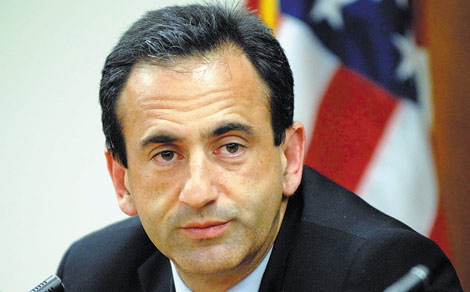
From Philip Gordon, the U.S. Department of State: [O]n working with Europe on global challenges, we have worked together as never before with our European partners on Afghanistan, on Iran, on missile defense, and on global economic recovery. Specifically:
- In Afghanistan, in the wake of the President’s speech in November 2009, Europe contributed about 7000 additional troops, over 100 training teams for the Afghan army and police, and nearly $300 million for the Afghan National Army trust fund. European nations now have almost 40,000 troops in Afghanistan and the total European contribution to Afghanistan since 2001 comes to $14 billion.
- On Iran, we maintained unity in our efforts to engage and have at the same time seen the strongest-ever set of sanctions adopted by the UN Security Council and even more robust set of follow-on sanctions adopted by the European Union. These additional measures taken by the EU cover a variety of areas critical to the regime including trade, finance, banking and insurance, transport, and the gas and oil sectors, in addition to new visa bans and asset freezes. These steps have raised the price of Iran’s failure to meet its obligations and we hope will serve to bring them back to the negotiating table.
- On missile defense, we gained broad support for our Phased Adaptive Approach which seeks to counter the real and current missile threats Europe faces from Iran and we are moving forward with plans to identify various basing locations. We hope defining Missile Defense as a NATO mission will be a major achievement of the NATO Summit in Lisbon.
- On the global economy, the United States has worked with Europe every step of the way. G-20 leaders agreed in Toronto this past July to maintain stimulus until the recovery is assured, while charting a common path to fiscal sustainability. They committed to halve deficits by 2013. And they committed to at least stabilize government debt-to-GDP ratios by 2016. We believe these are achievable goals, and we are committed to their success. …
Finally, what has arguably been the most controversial part of our European agenda – our reset with Russia – has started to pay significant dividends. We have made enormous progress in setting our bilateral relationship on a path of pragmatic cooperation. We can now say that effective diplomacy with Russia can help with U.S. global priorities. This diplomacy has already had some tangible benefits:
- Most significantly, we have concluded a New START Treaty. The agreement is the most comprehensive arms control agreement in nearly two decades and significantly reduces the number of nuclear weapons and launchers deployed by the United States and Russia while also putting in place a strong verification regime.
- We have concluded a lethal transit agreement for ferrying supplies to Afghanistan across Russia that is now an important logistics route for our efforts in Afghanistan and has completed more than 500 flights.
- We have secured cooperation with Russia on Iran, both in terms of a strong UN Security Council resolution and additional steps by Russia to ban the sale of S-300 missiles to Iran.
- We have done all of this without compromising our principles – in particular our steadfast commitment to the sovereignty and territorial integrity of all of the nations of Europe.
Excerpts from remarks by Philip Gordon, Assistant Secretary of State for European and Eurasian Affairs, at Johns Hopkins University. (photo: Hürriyet) (via Laura Rozen)
Image: hurriyet%2010%2020%2010%20Philip%20Gordon.jpg
